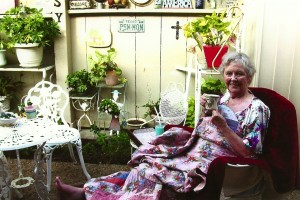Being with Patsy on a daily basis during her declining health, I was struck in a new way by an old thought. We spend much of our adult lives working to expand our world. The expansion begins slowly at birth, but once we achieve a certain level of adolescent independence, the expansion gets real traction. We go to college or get jobs that take us away from home and out further into the world. We travel, we buy houses and then move to bigger houses, we expand our circle of friends, and we do all the other things that come with adulthood. Our middle years should be spent seeing what we can do, seeing where we can go logistically, mentally, and experientially. That’s normal. Developmental psychologists say so, and experience says so.
As we get older, though, life begins to contract. It starts with cutting back on outside commitments, focusing on priorities rather than saying “Yes” to everything. Inevitably we have to start paying attention to our physical limitations. Gradually we downsize, we focus on fewer but more meaningful relationships. At some point, when health or circumstance forces us to slow down faster than we want to, our world gets smaller and smaller. Finally, for most of us, in our last days we will be reduced to one room at home or in a hospital, and the most basic needs will be provided by someone else, because we won’t be able to do them for ourselves.
Patsy had a sudden and unexpected contraction of life when she had surgery and the diagnosis of cancer. She had lived a big life. She had made her world big with lots of people, involvement in numerous activities, and lots of coming and going. Hers was a joyful experience most of us would envy. But at the moment of her surgery and diagnosis, her world began getting progressively smaller and her capabilities diminished dramatically. Fortunately her condo provided a comfortable place to settle into her smaller world.
 For several weeks we shuttled back and forth between the bedroom and the recliner in the living room. We called it “our dance” as she held onto my arms while I walked backward and she walked forward, toe to toe. Each day our dance steps became shorter and slower. She made it out to the patio each morning for a few weeks and even took one wheelchair ride down the sidewalk to visit a neighbor.
For several weeks we shuttled back and forth between the bedroom and the recliner in the living room. We called it “our dance” as she held onto my arms while I walked backward and she walked forward, toe to toe. Each day our dance steps became shorter and slower. She made it out to the patio each morning for a few weeks and even took one wheelchair ride down the sidewalk to visit a neighbor.
Eventually the patio became too much, and then even the recliner was beyond her strength. She spent her final few days in a room in the Hospice Center.
One of the emotional/spiritual signs of the end of life, according to Hospice literature, is a withdrawal or detachment from surroundings and relationships. Patsy did this. Not only did her physical world get smaller, but so did her mental and emotional world. In her last week she was unable to respond with more than a few words or a nod, though she could hear everything. With her eyes closed most of the time she seemed to move inward rather than outward. The focus became an introspective one, as if she were closing shop and doing final inventory. This seemed to be a part of her letting go of the outside world until she finally let go altogether.
 She had a dream a few nights before her death, a dream of water and fish. I asked, “Were you on Joe’s boat?”
She had a dream a few nights before her death, a dream of water and fish. I asked, “Were you on Joe’s boat?”
“I guess.”
Judy and I used that image over the last few days, of relaxing and letting the water take the boat wherever it needed to. I hope that’s the image she had at the end, of drifting effortlessly wherever the great current of life took her.
If so, I suspect her life, once it drifted far enough from shore, once again expanded, this time beyond comprehension.
1 Comment until now
John your writing is an oxymoron to me most of the time. I find it uplifting and peaceful, but it makes me cry, too.
Add your Comment!